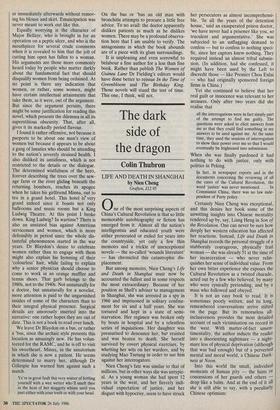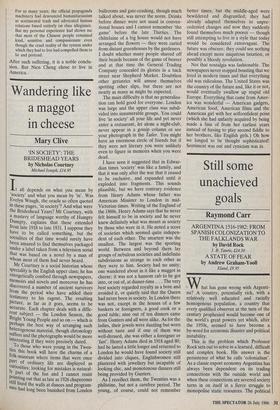The dark side of the dragon
Colin Thubron
LIFE AND DEATH IN SHANGHAI by Nien Cheng
Grafton, f12.95
0 ne of the most surprising aspects of China's Cultural Revolution is that so little memorable autobiography or fiction has emerged from it. Almost all the nation's intelligentsia and educated youth were either persecuted or exiled for years into the countryside, yet only a few thin memoirs and a trickle of unexceptional novels — the so-called 'wounds literature' — has chronicled this catastrophic dis- placement.
But among memoirs, Nien Cheng's Life and Death in Shanghai must now be accounted the fullest and in some respects the most extraordinary. Because of her position as Shell's adviser to management in Shanghai, she was arrested as a spy in 1966 and imprisoned in solitary confine- ment for six and a half years. She was tortured and kept in a state of semi- starvation. Her regimen was broken only by bouts in hospital and by a relentless series of inquisitions. Her daughter was pressurised to denounce her, but resisted and was beaten to death. She herself survived by covert physical exercises, by whetting her wits on her warders, and by studying Mao Tsetung in order to use him against her interrogators.
Nien Cheng's fate was similar to that of millions, but in other ways she was untypic- al. As a young woman she had spent 12 years in the west, and her fiercely indi- vidual expectation of justice, and her disgust with hypocrisy, seem to have struck her persecutors as almost incomprehensi- ble. 'In all the years of the detention house,' said an exasperated prison doctor, `we have never had a prisoner like you, so truculent and argumentative.' She was subjected to an unflagging demand to confess — but to confess to nothing speci- fic, since her captors knew nothing. They required instead an almost tribal submis- sion. (In addition, had she confessed, it might have been used by the Left to discredit those — like Premier Chou Enlai — who had originally sponsored foreign firms in China.) Yet she continued to believe that her real guilt or innocence was relevant to her accusers. Only after two years did she realise that
all the interrogations were in fact simply part of the attempt to find me guilty. The questions were asked to elicit answers from me so that they could find something in my answers to be used against me. At the same time, they used the sessions of interrogation to show their power over me so that I would eventually be frightened into submission.
When she was finally pardoned it had nothing to do with justice, only with politics in Peking.
In fact, in newspaper reports and in the documents concerning the reviewing of all the cases of the Cultural Revolution, the word 'justice' was never mentioned. . . . In Communist China, there was no law inde- pendent of Party policy.
Certainly Nien Cheng was exceptional, and this denies her book some of the unwitting insights into Chinese mentality rendered up by, say, Liang Heng in Son of the Revolution. One can never be sure how deeply her western education has affected her reactions. Instead, Life and Death in Shanghai records the personal struggle of a stubbornly courageous, physically frail woman — she was already 51 at the time of her incarceration — who never relin- quishes her sense of individual value. From her own bitter experience she exposes the Cultural Revolution as a twisted charade, acted out by a few who believed, by many who were cynically pretending, and by a mass who followed and obeyed.
It is not an easy book to read. It is sometimes poorly written, and its long, remembered conversations arrive stilted on the page. But its remorseless all- inclusiveness provides the most detailed account of such victimisation on record in the west. With matter-of-fact unsen- timentality, the author inducts the reader into a disorienting nightmare — a night- mare less of physical deprivation (although that was bad enough) but of a perverted mental and moral world, a Chinese Dark- ness at Noon.
Into this world the small, individual moments of human pity — the hints or concessions of her guards and others drop like a balm. And at the end of it all she is still able to say, with a peculiarly Chinese optimism:
For so many years, the official propaganda machinery had denounced humanitarianism as sentimental trash and advocated human relations based entirely on class allegiance. But my personal experience had shown me that most of the Chinese people remained kind, sensitive and compassionate even though the cruel reality of the system under which they had to live had compelled them to lie and pretend.
After such suffering, it is a noble conclu- sion. But Nien Cheng chose to live in America.



















































 Previous page
Previous page